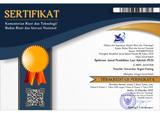Relationship between Educator Supervision and Discipline Behavior of Santri at the Tahfidz Nurul Ilmi Kuranji House, Padang City
 ), Jamaris Jamna(2),
), Jamaris Jamna(2), (1) Universitas Negeri Padang
(2) Universitas Negeri Padang
 Corresponding Author
Corresponding Author
DOI : https://doi.org/10.24036/spektrumpls.v9i1.111250
Full Text:
 Language : en
Language : en
Abstract
In the world of education, disciplinary behavior needs to be applied so that the atmosphere becomes orderly and can support or help the goals of education itself. One of the ways to enforce disciplinary behavior is the supervision of educators. Supervision from educators is a stimulation or stimulation so that disciplinary behavior itself can occur. This study aims to determine the description of educator supervision, to know the description of disciplinary behavior, and how to determine the relationship between the two. This type of research is a quantitative study with a correlational approach. The population of the study was all students who were active in the Tahfidz Nurul Ilmi Kuranji house in Padang City, amounting to 114 people. The research sample taken based on the Slovin formula with a total of 53 samples. The data collection technique is in the form of a questionnaire and the data collection tool is a questionnaire. The data analysis technique in this study used a percentage formula and product moment. The results showed that: (1) teacher supervision was still low, (2) disciplinary behavior was still low, and (3) there was a significant relationship between teacher supervision and disciplinary behavior of students at the house of Tahfidz Nurul Ilmi Kuranji, Padang City. Based on this research, it is hoped that educators will be able to supervise the students in order to help them encourage disciplinary behavior. Then it is hoped that all parties involved in the tahfidz house of Nurul Ilmi Kuranji in Padang City can help with the problems that occur so that learning and teaching activities at Tahfidz's house can run well.
Keywords: Educator supervision, Discipline Behavior, SantriReferences
Engkoswara, & Komariah. (2011). Administrasi Pendidikan. Bandung: Alfabeta.
Guza, A. (2005). Undang-Undang Guru dan Dosen, (UU RI No. 14 Th 2005). Jakarta: Asa Mandiri.
Hadianti, L. S. (2008). Pengaruh Pelaksanaan Tata Tertib Sekolah terhadap Kedisiplinan Belajar Siswa (Penelitian Deskriftif Analisis di SDN Sukakarya II Kecamatan samarang Kabupaten Garut). Jurnal Pendidikan UNIGA, 2(1), 1–8. Retrieved from https://journal.uniga.ac.id/index.php/JP/article/view/11
Hikmat. (2009). Manajemen Pendidikan. Bandung: CV Pustaka Setia.
Mulyasa, E. (2011). Manajemen dan Kepemimpinan Kepala Sekolah. Jakarta: Bumi Aksara.
Notoatmodjo, S. (2011). Kesehatan Masyarakat. Jakarta: Rineka Cipta.
Notoatmodjo, Soekidjo. (2003). Pengembangan Sumber Daya Manusia. Jakarta: Rineka Cipta.
Nurmayani. (2009). Hukum Administrasi Daerah. Bandar Lampung: Universitas Lampung.
Shabir, M. (2015). Kedudukan Guru Sebagai Pendidik: Tugas dan Tanggung Jawab, Hak dan Kewajiban, dan Kompetensi Guru. AULADUNA: Jurnal Pendidikan Dasar Islam, 2(2), 221–232.
Soelaiman, J. (2006). Konsep Dasar Pendidikan Luar Sekolah. Jakarta: Bumi Aksara.
Soleh, A., Maya, R., & Priyatna, M. (2018). Metode Halaqah dalam Pembelajaran Tahfidz Alquran di Pondok Pesantren Tahfidz Alquran Darussunnah Parung Kabupaten Bogor Tahun 2018. In Prosiding Al Hidayah Pendidikan Agama Islam (pp. 43–52).
Sondang, S. P. (2005). Fungsi-fungsi Manajerial. Jakarta: Bumi Aksara.
Suparlan. (2005). Menjadi Guru Efektif. Yogyakarta: Hikayat.
 Article Metrics
Article Metrics
 Abstract Views : 151 times
Abstract Views : 151 times
 PDF Downloaded : 69 times
PDF Downloaded : 69 times
Refbacks
- There are currently no refbacks.

This work is licensed under a Creative Commons Attribution-NonCommercial 4.0 International License.



